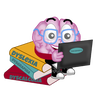|
Overcoming Dyslexia by Sally Shaywitz Dr. Sally Shaywitz, co-director of the Yale Center for the Study of Learning and Attention and a leader in the current research into how the brain works, offers the latest information about reading problems and proven, practical techniques that, along with hard work and the right help, can enable anyone to overcome them. This book is essential for understanding the physiological changes within the dyslexic brain. A fascinating and life-changing read for those new to the world of dyslexia. The Dyslexic Advantage by Brock Eide and Fernette Eide
Did you know that many successful architects, lawyers, engineers—even bestselling novelists—had difficulties learning to read and write as children? In this groundbreaking book, Brock and Fernette Eide explain how 20% of people—individuals with dyslexia—share a unique learning style that can create advantages in a classroom, at a job, or at home. Blending personal stories with hard science, The Dyslexic Advantage provides invaluable advice on how parents, educators, and individuals with dyslexia can recognize and use the strengths of the dyslexic learning style. Invaluable for understanding the inherent strengths of your child’s dyslexic mind. Right Brained Children in a Left Brained World by Jeffery Freed and Laurie Parsons I always love to learn from others who are hands on in the field. This book is just that. Written by a former teacher and educational therapist, it is full of real life examples of how right-brained thinkers learn best. Full of ideas for teaching strategies too. Now if they would just write Left Brained Parents in a Right Brained Home! The Dyslexia Empowerment Plan by Ben Foss After years of battling with a school system that did not understand his dyslexia and the shame that accompanied it, renowned activist and entrepreneur Ben Foss is not only open about his dyslexia, he is proud of it. In The Dyslexia Empowerment Plan he shares his personal triumphs and failures so that you can learn from his experiences, and provides a three-step approach for success: • Identify your child’s profile: By mapping your child’s strengths and weaknesses and assisting her to better understand who she is, you can help your child move away from shame and feelings of inadequacy and move toward creating a powerful program for learning. • Help your child help himself: Coach your child to become his own best advocate by developing resiliency, confidence, and self-awareness, and focusing on achievable goals in areas that matter most to him. • Create community: Dyslexic children are not broken, but too often the system designed to educate them is. Dare to change your school so that your child has the resources to thrive. Understanding your rights and finding allies will make you and your child feel connected and no longer alone. Packed with practical ideas and strategies dyslexic children need for excelling in school and in life. Homeschooling the Challenging Child by Christine Field Written by a former lawyer turned homeschool mother, this book is not exclusively about homeschooling a child with dyslexia rather more about the issues surrounding homeschooling kids with all kinds of challenges. Chapters address how to deal with issues stemming from various learning disabilities, attention disorders, personality clashes, learning styles, discipline problems, managing stress and discouragement, how to plan a program, and the importance of keeping in mind the tenets of God’s love and forgiveness. Hands-on tips for managing a successful home education program, as well as how to find professional help from support groups. Unicorns Are Real: A Right-Brained Approach to Learning by Barbara Meister Vitale If you are hopelessly left-brained (linear and logical) like me, you will love this book. Written in an easy to understand style and full of real life practical strategies for teaching the predominantly right-brained learner. The book begins with an easily understood, yet surprisingly in-depth description of brain structure and function as it pertains to learning. The book also contains simple, do-at-home procedures for testing your child for brain dominance. Your Child’s Growing Mind by Dr. Jane Healy Considered the classic guide to understanding children’s mental development. She explains the building blocks of reading, writing, spelling, and mathematics and shows how to help kids of all ages develop motivation, attention, critical thinking, and problem-solving skills. She also looks at learning issues, ADHD, and the influences of electronic media – all through the lens of the science of childhood development. Parenting the Struggling Reader by Susan Hall and Dr. Louis Moats A very comprehensive, practical guide for recognizing, diagnosing and overcoming any childhood reading difficulty. Written by a mother of a struggling reader (who is also on the board of directors of the International Dyslexia Association) and an educational researcher, this book contains both the clinical information a parent needs but also the practical, everyday solutions and tips needed to successfully help your struggling reader. Contains an extensive explanation of our role as advocate for our children. Sections are as follows:
0 Comments
Your comment will be posted after it is approved.
Leave a Reply. |
LEXIA LEARNERS LOUNGE
AuthorJess Arce is a homeschool mom of four, a tutor for children & adults who struggle with Dyslexia & Dysgraphia and an all around entrepreneur. She is passionate about helping others understand dyslexia. |
